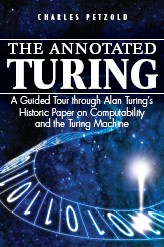Speaking at the University of Toronto on March 5
February 24, 2009
New York, N.Y.
I am very pleased to announce that I will be speaking at the University of Toronto on Thursday, March 5, 2009. The talk is free and open to the public, and will be held in Room 1160 of the Bahen Centre at 40 St. George Street starting at 7:00 pm. Here's a description:
-
Alan Turing's Amazing Imaginary Computing Machine
-
In 1936, English mathematician Alan Turing invented an imaginary computing
machine to help him solve a problem in mathematical logic. From these
humble beginnings, the Turing Machine has become an essential tool in
understanding computation and so much more. In a discussion largely free
of mathematics and technical issues, Charles Petzold — author of the
recent book The Annotated Turing — traces the history of this odd
mathematical tool: from its original conception in 1936, to its starring
role in the cybernetics movement of the 1940s and 1950s, to its
application by philosophers, neurologists, physicists and cosmologists in
everything from understanding human consciousness to grappling with the
information-saturated universe in which we live. In our post-Turing world,
everything is a Turing Machine.
-
Charles Petzold is the author of Code: The Hidden Language of Computer
Hardware and Software (Microsoft Press, 1999), The Annotated Turing: A
Guided Tour through Alan Turing's Historic Paper on Computability and the
Turing Machine (Wiley, 2008), and several best-selling books on computer
programming.
Hope to see you there! (And bring one of my books if you want it autographed.)
February 25, 2009
Here's the page on the UT web site announcing the event, including a map:
-
http://www.events.utoronto.ca/index.php?action=singleView&eventid=3401

|
Wiley | Amazon US | Barnes & Noble |
| Amazon Canada | Amazon UK | Amazon Deutsch | |
| Amazon Français | Amazon Japan | Blackwell | |
| “Petzold will be a stalwart companion to any reader who undertakes to read Turing's classic with his aid. The Annotated Turing will also be quite enjoyable to a more casual reader who chooses to dip into various parts of the text.” — Martin Davis in American Scientist | |||